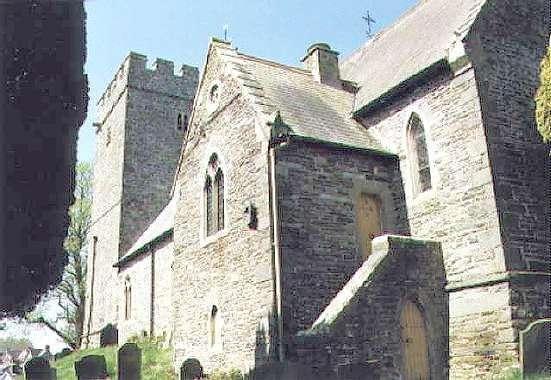Shelby
Editor’s Note: My son David is guest-blogging with another post about the history of the Smith family.
This isn’t about my sister, but it is about her name. I’ve always heard that my parents named Shelby after the county surrounding Memphis, Tennessee. Their logic was that, surely, some of our ancestors had passed through there on their way to Texas. That’s sort-of right. It turns out that there is a long line of people named Shelby in our family’s lineage, including the guy after whom Shelby County, TN is named! At the end of the Shelby line, Mary Doom Shelby married my great-great-grandfather, George Washington Smith, in 1889 in east Texas. How her ancestors got her there is a colorful tale.

Our story starts in a small castle in Tregaron, Cardiganshire, Wales, the ancestral home of most Shelby’s in the United States. Shelby Phillip (1650-1731) was a yeoman who owned a farm near Tregaron called Derlyn. Much of what we know of him is from the Church Records of St. Caron’s Church (Church of England). These records show that his name was written as Selby until the year 1709 when the records begin consistently using the name Shelby. He was named using the old Welsh system of patronymics by which a child took his father’s first name as his last name. So, although his name was Shelby Phillip, his son was Evan Shelby.
Supposedly, the King requested men and–based on his standing in the feudal system–Shelby Phillip was obligated to send them to Ireland under command of his son, Evan (1690-1751). After the end of the campaign, Evan’s family was disgraced when he returned with an Irish, Roman Catholic bride. His parents demanded that she be sent back to Ireland and the marriage be annulled. At that time, Protestants could be executed for marrying Catholics. Evan refused. He attempted to settle but everyone shunned him, including his parents. I don’t believe this story because the records I have show that his wife was born in Tregaron, has the very Welsh name of Catherine Morgan-Davies, and died in the American colonies. I don’t have any records of an Irish wife. I’m declaring this story an Internet urban legend.
Whatever the reason for leaving Wales, Evan emigrated to America with his wife and four children, arriving in Philadelphia in 1735. They settled in Lancaster County, PA and later acquired land that straddled the Mason-Dixon line.
Evan Shelby’s son Evan, Jr. (1719-1794) called Maryland home, but became involved in the fur trade up north. Among his concerns were trading posts in Michilimackinac (among the best place names I’ve ever heard) and Green Bay. He later fought in the French and Indian War. The war negatively affected the fur trade and, with his fortunes on the wane, he moved to southwest Virginia in hopes of better days. He revived his wealth through cattle-raising and farming. With the onset of the American Revolution as well as conflicts with the local Indian tribes, he resumed his military career. In 1781, after re-drawn borders put his farm in North Carolina, he was elected to the N.C. senate, and five years later the state named him brigadier general of the western N.C. militia.

Evan, Jr.’s son Isaac (1750-1826) left the biggest historical footprint. As a young man, he fought in two wars: Lord Dunmore’s war (he served as second in command under his father against the local native tribes) and the Revolutionary War (playing a pivotal role in the 1780 Battle of King’s Mountain). As compensation for his meritorious military service, he received land in Kentucky. There, he helped lead Kentucky’s transition from a county in western Virginia to a full-fledged state. His influence and leadership abilities were such that he was elected to become the first governor of Kentucky in 1792. When his term ended, he retired from public life. But when the War of 1812 broke out, Kentuckians recruited him out of retirement to lead them through the war. He won election easily and served a second term as Kentucky’s fifth governor from 1812 to 1816. At the age of 62, and as the sitting governor, he personally commanded the troops from Kentucky at the Battle of the Thames in Ontario, a critical turning point in that war. Counties in no fewer than nine states are named in honor of the great Governor Shelby, including those in Kentucky, Tennessee, Alabama, and Texas.
Governor Isaac’s grandson, Alfred J. Shelby (1811-1880), moved his family from Tennessee to Jasper, Texas. While it’s not clear exactly why he did so, it’s worth noting that many folks in other parts of my family tree also moved to Texas in the mid- to late-1800’s. Was it the Civil War or other political factors that precipitated their departure? Was it the promise of economic opportunity in Texas? Hard to tell. Mary Doom Shelby, my great-great-grandmother who became a Smith, was Alfred’s granddaughter.
Leave a Reply